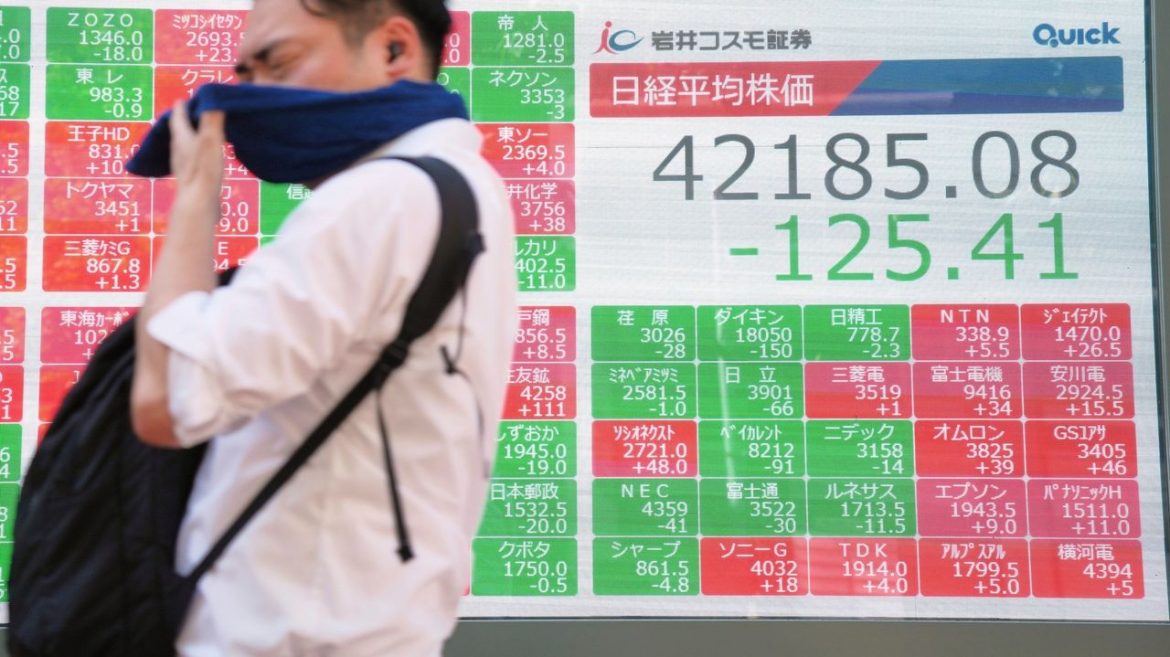TOKYO — Asian shares mostly declined, with cautious trading on the Tokyo Stock Exchange amid political uncertainty, but European shares edged up in early Wednesday trading.
France’s CAC 40 rose 0.6% in early trading to 7,701.41, while the German DAX edged up 0.4% to 23,576.33. Britain’s FTSE 100 added 0.4% to 9,152.13. U.S. shares were set to trade mixed with Dow futures down 0.1% at 45,301.00, while S&P 500 futures rose 0.4% to 6,449.50.
Earlier in Asia, Japan’s benchmark Nikkei 225 shed nearly 0.9% to finish at 41,938.89.
The fate of Japanese Prime Minister Shigeru Ishiba has been uncertain for weeks, with calls growing both for him to resign and to remain, after a recent election defeat and the rise of fringe parties shook public faith in the ruling Liberal Democratic Party. Confidence was rocked further by a recent comment from Ishiba’s ally, Hiroshi Moriyama, who said he was stepping down as party secretary general.
“The political tremor is domestic, with Prime Minister Ishiba’s key power broker signaling his resignation, shaking the foundations of the ruling party,” said Stephen Innes, managing partner at SPI Asset Management.
Australia’s S&P/ASX200 slipped 1.8% to 8,738.80. South Korea’s Kospi edged up 0.4% to 3,184.42. Hong Kong’s Hang Seng lost 0.6% to 25,343.43. The Shanghai Composite shed 1.2% to 3,813.56.
In the United States, longer-term Treasury yields are feeling additional pressure from President Donald Trump’s attacks on the Federal Reserve for not cutting interest rates sooner. The fear is that a less independent Fed will be less likely to make the unpopular decisions needed to keep inflation under control over the long term, such as keeping short-term rates higher than investors would like.

People walk in front of an electronic stock board showing Japan’s Nikkei index at a securities firm Wednesday, Sept. 3, 2025, in Tokyo. Credit: AP/Eugene Hoshiko
A U.S. federal appeals court ruled late Friday that Trump overstepped his legal authority when announcing sweeping tariffs on almost every country, though it left the tariffs in place for now. Trump’s tariffs have created confusion across the global economy and may have hurt the U.S. job market. But less income from them could also force the U.S. government to borrow more to pay its bills, according to Scott Wren, senior global market strategist at Wells Fargo Investment Institute.
The worse-than-expected data on manufacturing could give the Federal Reserve more leeway to cut its main interest rate for the first time this year at its next meeting in a couple of weeks. That’s the widespread expectation among traders, though economic reports coming later this week could change things.
The highlight for the week is coming on Friday, when economists expect a report to show that U.S. employers upped their hiring last month. Last month’s weaker-than-expected jobs report raised worries about the economy and cranked up expectations for coming rate cuts by the Fed.
In energy trading, benchmark U.S. crude fell 36 cents to $65.23 a barrel. Brent crude, the international standard, fell 37 cents to $68.77 a barrel.

A person walks in front of an electronic stock board showing Japan’s Nikkei index at a securities firm Wednesday, Sept. 3, 2025, in Tokyo. Credit: AP/Eugene Hoshiko
In currency trading, the U.S. dollar edged up to 148.65 Japanese yen from 148.34 yen. The euro cost $1.1660, up from $1.1646.
#European #shares #rise #Asian #benchmarks #finish



